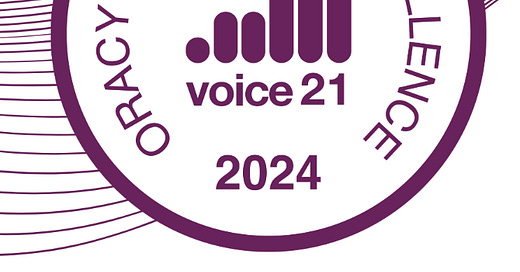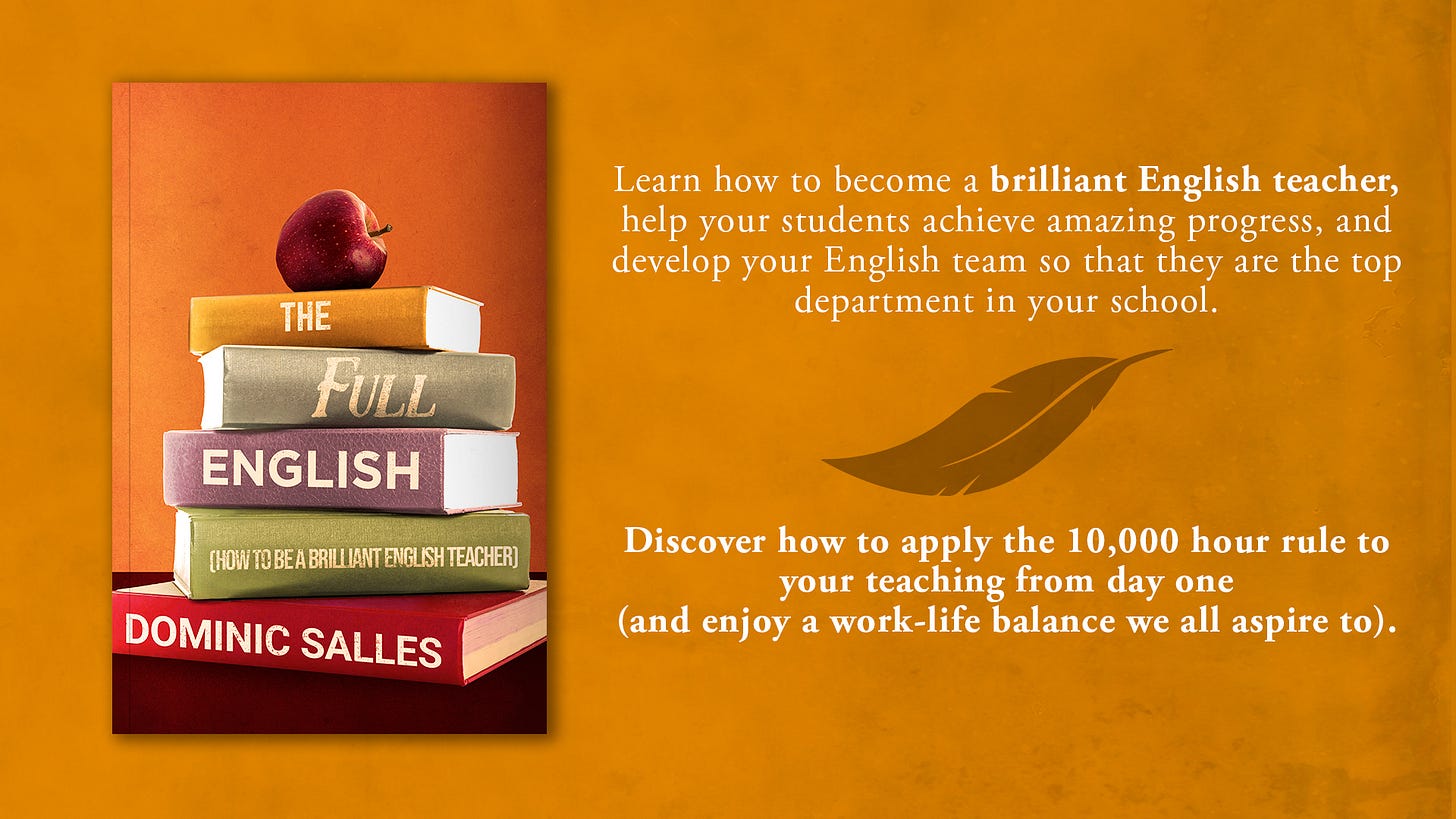FFT Datalab has reviewed the impact of Voice 21 in primary schools. It has no impact on progress. It is a waste of time - because that time spent doing something with far more impact would have had, well, far more impact.
Which is a shame, because we really, really want to an oracy based curriculum to work, don’t we?
It aligns with all our values. So, it must be right.
Being right is not enough.
You have to be right at scale. If you can’t scale it, you are pretty much wrong.
Here’s a personal example. I’ve told this story before. You can skip it, and hit the Voice 21 heading below.
A few years ago I read loads of cognitive science about story, and how narrative is “privileged” in memory. Everything is easier to remember in a story.
So, I thought, what if I could write a Spanish curriculum taught entirely through story.
And what if I could plan for the recurrence of words at the right Ebbinghaus spacings?
And what if I could plan real spoken tasks that students practised for 10 minutes every lesson, so that they actually learned to speak the language?
I persuaded a friend, parachuted in as a deputy to take over a low achieving year 8 class. Progress results said it worked, but the head of languages hated the curriculum, and once the parachute was no longer required, the deputy went back to teaching English.
I improved the curriculum and persuaded a colleague to teach it to year 9. Progress results said that it worked better than the traditional curriculum used by other classes, even though she ditched the spoken part of the lesson. She didn’t enjoy it. The MAT MFL lead had visite and didn’t like it either.
She met up with me after a couple of terms. Tentatively she asked if I would be offended if she ditched my curriculum.
Just to clarify, I said, the progress from this class is far out performing the progress of the other classes (one of which you teach) in Spanish. And you don’t want to teach this curriculum because you don’t enjoy it as much?
Yes, she said. She was hugely apologetic. Would I, she asked, would I try to run it with different volunteers next year?
No. Hell no. I was right. The progress data showed I was right. But if it couldn’t work at scale, I might as well be wrong.
Voice 21
Will the good people at Voice 21 take the same approach? Will they devote their moral purpose, skill and energy to developing a curriculum that works at scale?
Hell no.
Most of us will simply dismiss evidence which contradicts our most profound beliefs. This is a human trait. But it is also, I think, a very pronounced teacher trait.
Our strongest CPD is our experience, day to day, in the classroom. If we value talk, and get our students, and ourselves, to talk through every lesson, we will continue to see fantastic evidence that many of our students are more confident at talking. So, our experience will always tell us that talk works.
But, if we then ask whether our students are any better at reading, or writing, or communicating successfully in an exam, we find that talk has helped not one iota.
So we don’t ask.
FFT Datalab has asked
Main findings
• This report evaluates the effect of the Voice 21 Oracy Schools membership programme on attainment at Key Stage 2 and in the Early Learning Goals relating to communication and language at the end of the Early Years Foundation Stage in the 2021/22 academic year.
• It also looks at the impact on participants broken down into subgroups based on their level of engagement with the programme, and the length of time that they took part.
• The evaluation includes primary schools that joined the project between its launch in September 2020 and January 2022.
• This report did not find conclusive evidence that the programme had an impact on either Key Stage 2 attainment or on the likelihood of pupils achieving the relevant Early Learning Goals. However, while estimates of the impact were not statistically significant, they were positive for all of the outcomes measured.
• We did not find conclusive evidence to suggest that the programme had a higher impact on those schools that had taken part over a longer period.
• We found some evidence to suggest that the programme has more of an impact on KS2 reading in schools that reported higher levels of engagement from their teachers, although this didn’t appear to be the case for the other outcomes.”
You can read the full report here.
If you want to know how to dramatically improve the progress of students in English, at scale, in your class, across your department, or your MAT, my book The Full English will show you.
How do Voice 21 Rate Their Own Impact?
Well, not with progress measures.
This is what they say.
We provided 20,780 hours of support to 852 schools.
We reached just under 203,000 students, from Jersey to Dundee.
69% of the schools we worked with last year are in the top 40% of schools with the greatest proportion of students eligible for Free School Meals.
Over 3 years, the number of teachers in schools we work with who rated themselves as confident oracy practitioners, increased from 30% to 70%.
By the end of our two-year Voicing Vocabulary project, students in Year 6 and 7 were more likely to have an above-average reading score than their peers nationally.
We used comparative judgment to assess the oracy skills of 463 Year 5 students in 55 Voice 21 Oracy Schools across England and Wales, generating an average school oracy score. We found that this average score improves by 50% when we compare first and fourth-year Voice 21 Oracy Schools.
I wonder what the impact on reading progress might have been if they had spent “20,780 hours of support to 852 schools” actually trying to do that?






Ah I see. I will have a look. That is so interesting/telling regarding the hundreds of schools who eagerly adopted the failed approach because it appealed to their valued.
I just don’t get that personally. One would think heads would want students to make the most progress possible within the richest curriculum, but it would seem that these two concepts are often viewed as mutually exclusive?! Weird. You must find this very frustrating when you come up against this mindset.
Haha! Don’t be intimidated! I think both you and KB have a lot in common; to me you are both perspicacious magicians. You take the basics and common sense and work magic with them. You both have laser focus on the wood, where so many of us get so bogged down and distracted by the trees!
Of course I’ve never visited Michaela, and only know what I’ve seen in documentaries or read. I am a bit fascinated/obsessed by consistency though, and having worked in many different schools over the years (usually in deprived catchment areas with high numbers of SEND students) I can’t help thinking if some school policies were universal (well, within the UK anyway!), behaviour, learning and progress would be so much better. And Michaela is consistency taken to the extreme perhaps!
That is very interesting with regard to your daughter’s friend’s experience there. And rather sad too. I’m seduced though, by inner-city kids achieving what they do at Michaela, and escaping gang culture at Oxbridge etc.! Impressive as it is, I imagine there is no room for being slightly creative as a teacher in the classroom. Your methods and guidance still allow for creativity, and it’s obvious you are very creative. That must be what’s missing. If we could just marry the two! Not literally, as not sure Mrs Salles would be very impressed 😂😂.
Thank you for this very interesting piece Dominic. I’m not familiar with Voice 21, but what a shame. I take it it was an experiment and hadn’t been rigorously tested for the effect it had on student progress against government benchmarks (maybe not the best - but what we have to work with!)? In that case, what a waste of children’s and teachers’ time from a progress point of view.
On the other hand, your experience with redesigning the Spanish curriculum, so that there was much more clear, tangible progress than with the old curriculum, is depressing. I’m certain not an MFL expert, but your curriculum sounded like a more natural, immersive way of learning the language. It blows my mind that the teachers thought, “Well Dominic’s method leaves my class shooting ahead, but I like my less effective way better, so I’m going to let my ego win and let my students lose.” Grrr 😡!
Katherine Birbalsingh, my other educational hero, says her teachers have to leave their egos at the door.
That has really stuck with me. I wish more teachers would and fear that’s often what you might be up against when you’re trying to turn things round in schools. Fortunately, you have a very clear evidence base, I think, to show your methods hugely improve progress.